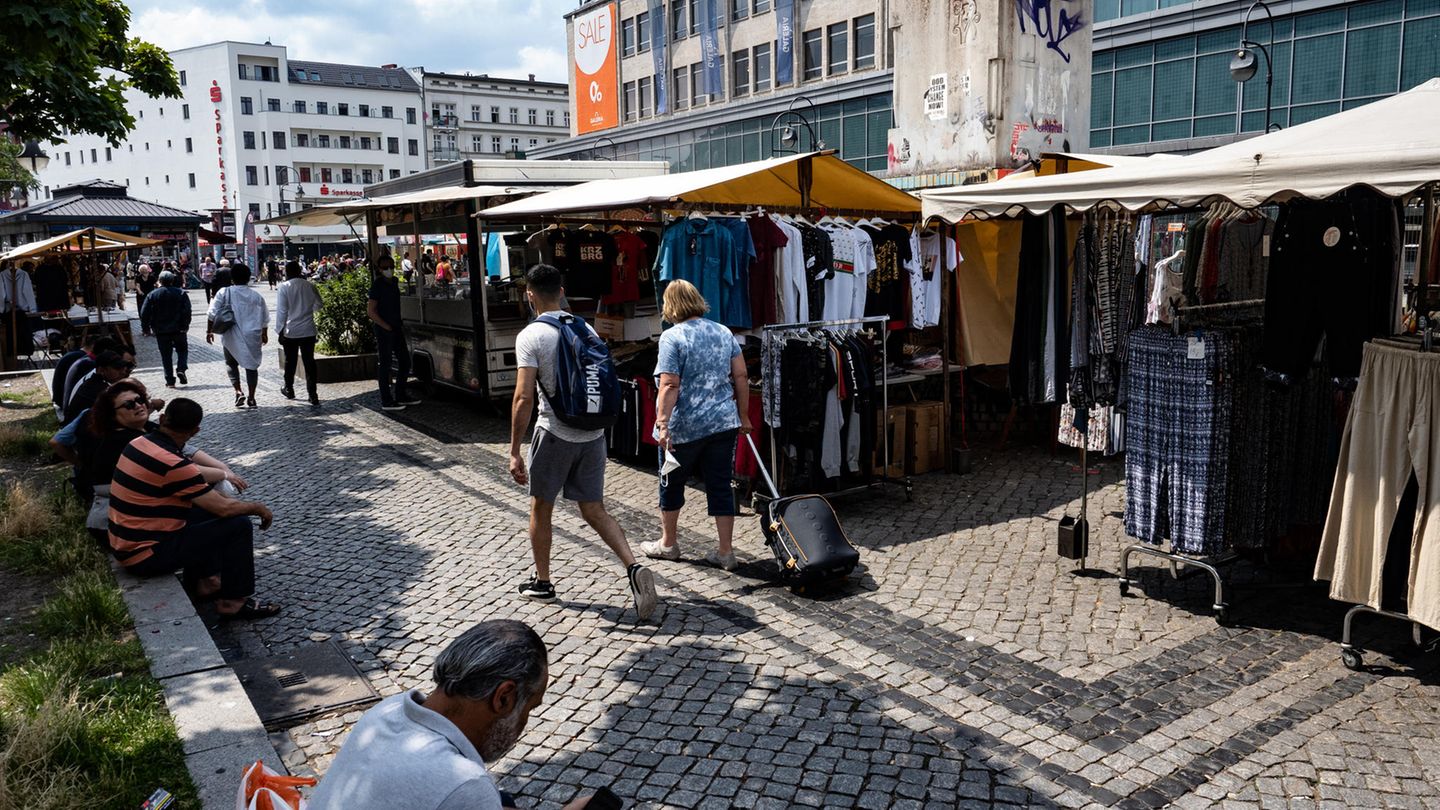Money? Coupons? Berlin’s Neukölln district has been using completely different vaccination incentives for months. In the socially disadvantaged areas in particular, consultants want to reach people in everyday life – in the market, in the park or at TikTok. A visit.
How many people in the Berlin district of Neukölln will be vaccinated in the corona pandemic? A maximum of 50 to 60 percent, says Albert Ngwa. More is probably not possible with the vaccination quota. He didn’t just take the impression out of thin air. Ngwa is part of the district’s intercultural education team, five people, 13 foreign languages, he advises everyone who wants to about corona and vaccination. “Women are more sensitive,” says Ngwa. “They listen and ask sensible questions.” Men were more likely to say: “I already know.”
Sometimes Neukölln – with 330,000 inhabitants a big city in the federal capital – is like a magnifying glass for social developments in Germany. The district not only stands for keywords such as Rütli school or a high proportion of migrants. Neukölln also has a health department and a pandemic staff that seem ahead of all those who are now calling out that the vaccine must now come to the people. Neukölln was that far in spring. Hardly anyone just listened.
Vaccination fatigue, vaccine picking – and what now?
In the Neukölln health department, red boxing gloves hang on the filing cabinet in the room of medical officer Nicolai Savaskan, a scooter leans against the wall, sometimes border collie crossbreed Woody lies under the desk. Savaskan, in his early 50s, an epidemiologist, is the opposite of the stereotype that some may have in their minds about the dumped and dusty public health service. He is busy, eloquent, objective, always available and often already two to three steps ahead in his head. All gold in this pandemic.
Savaskan is currently thinking about pop-up health kiosks that could be placed where many people voluntarily go – at the weekly market, in parks, in swimming pools, in schools. There was already a previous model: a truck trailer was at a weekly market in the spring. A medical officer sat there and offered free corona tests when they were hardly available anywhere else. The advisory team fanned out and sent interested parties there.
Even back then, Savaskan wanted a vaccination offer in the trailer, in order to reach all those who do not make an effort to make appointments themselves. Opening and closing vaccine picks is one of the traditional tasks of the German health authorities. But his highest authority, the Berlin Senate Department for Health, only relied on vaccination centers at that time, and later also on medical practices. The health authorities, it was said, had enough to do with the follow-up of contacts.
In March, the medical officer and his team were mentally already there where some federal and Berlin politicians seem to be just arriving: Vaccination fatigue, vaccination picking – and what now? According to the latest assessment by the Robert Koch Institute, 85 percent of German citizens between the ages of 12 and 60 and 90 percent of the population over the age of 60 must be fully vaccinated so that the pandemic could finally come to an end. At the moment it’s around 45 percent.
Savaskan believes that a vaccination rate of 70 percent is possible in Neukölln. For him, there are only one to two percent stubborn vaccine opponents, with whom nothing can be done. You can talk to the crucial 10 to 15 percent that may be missing in the end, he says. Only with a concept, please, and under no circumstances from your desk.
When the Senate Health Administration patted itself on the shoulder in May for the first vaccination vaccination in Neuköllner Kiezen with high incidences, Savaskan said: “A surcharge, yes. But we don’t necessarily reach those we need with it.” For him, these are the uninformed, the disinformed and also all those who cannot do much with information from the authorities and flyers. In Neukölln’s social hot spots, which can easily lead to nationwide peak incidences simply because of cramped living conditions and cheap jobs without home office, there must be fine adjustments. A detailed, individual and culturally sensitive advice. And the syringe quickly on top, for everyone who then wants it.
But until the beginning of July he did not get through the thick layers of clay that seems to exist in Berlin between the districts and the Senate administration. “We’ll take that with us,” they say in the rounds with the twelve Berlin medical officers. For what often follows, Savaskan has his own diagnosis. He calls it “administrative constipation”, in German: constipation.
“We want to poke fun at people. But dear.”
Doctor Christine Wagner is also sitting in Savaskan’s room. She is in her late 30s and has been working on podcasts and video clips on the subject of pandemics for more than a year: “Entertaining, humane, not with a raised index finger. We are like a translator’s office.” Also for official German. Wagner now has a team of five. Ozam Yagbasan is 24 and is watching what the video portal TikTok is currently offering in Arabic on the subject of a pandemic. “Hardly any of my friends surf on ‘berlin.de’,” he says. His colleague Serkan Cetinkaya, Turkish roots, actor and comedian, explains the tactics, also for vaccination education: “We want to poke fun at people. But dear.” Humor instead of prohibitions, languages and cultures can overcome that – even with serious issues.
The north of Neukölln is rich in socially disadvantaged areas between its party miles and trendy cafés, which are now called planning rooms. Statistically speaking, almost every second citizen with foreign roots has a below-average education here. More than one in three is at risk of poverty, measured by average income.
Even before the pandemic, researchers calculated that all of this could cost an average of ten years of life. “In Neukölln, not in Afghanistan,” says Savaskan. However, he does not consider real-life education and vaccination offers to be necessary only for people with a migration background. Educational status and living conditions are decisive. “Even Grandma Kasupke can simply slip through the system. And she needs the vaccination most of all.”
The topic of on-site vaccination has now arrived on the big political stage in Berlin a few months late. Medical officers, it is now said, should also vaccinate, very soon. And there must be incentives. Maybe even money? It would have to be around 50 euros for a spade, the Berlin Humboldt University concluded from its surveys. Medical officer Savaskan thinks this is too much of a good thing. “Money or shopping vouchers would probably arouse skepticism in Neukölln,” he says. “The people here are not used to receiving money from the authorities. They would ask: What does the state want to sell me here?”




